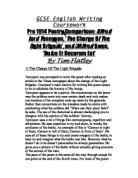In this essay I am going to examine the two poems by Wilfred Owen and Alfred Lord Tennyson, Dulce et Decorum Est and The Charge of the Light Brigade.
In this essay I am going to examine the two poems by Wilfred Owen and Alfred Lord Tennyson, Dulce et Decorum Est and The Charge of the Light Brigade. I will do so by comparing, contrasting, and explaining what the two poets are trying to say. Looking at the similarities and differences in each poem because both of these poets have different views on war.
Firstly Dulce et Decorum Est was written by Wilfred Owen in 1917 during the first World War and he actually experienced the war so these are his real feelings and all of these things happened to him! The poem is quite dramatic and this is his personal response to tell us how he feels. Most of his poems are written about the war because this was his life he lived and died in the war. Where as Alfred Lord Tennyson wrote his poem from as newspaper article, so he didn’t actually experience a war. His poem was written from information, not from feelings and thoughts like Wilfred Owen!
The language used is first person because he was there experiencing the war where as in Alfred Lord Tennyson’s poem it is third person. He uses a very active voice, a very strong rhythm, beat and tempo. The poem is extremely descriptive and he uses lots of similes and metaphors to give you images in your head, so you think more about his feelings. He is trying to give you a true picture of war because everyday people of the world don’t witness things like these. He is very angry about what is happening in the war and is expressing this in his poem. At the end of his poem he quotes “The old lie: Dulce et Decorum est Pro patria mori.” Which means it’s a lie, its not proud, good and fitting to die for your country. He thinks that the war was pointless and that people died for nothing! This is the point he is trying to put across to his readers. With the similes he uses, he tries to shock you by telling you the bad conditions the soldiers had to suffer, like “knock-kneed, coughing like hags we cursed through the sludge.” Then later on in the last stanza he describes what the soldiers are going through after a mustard gas attack trying to make you feel sick saying, “If you could hear, at very jolt, the blood come gargling from the froth-corrupted lungs, bitter as the cud”. An example of a metaphor is “All went lame, all blind; drunk with fatigue”.







